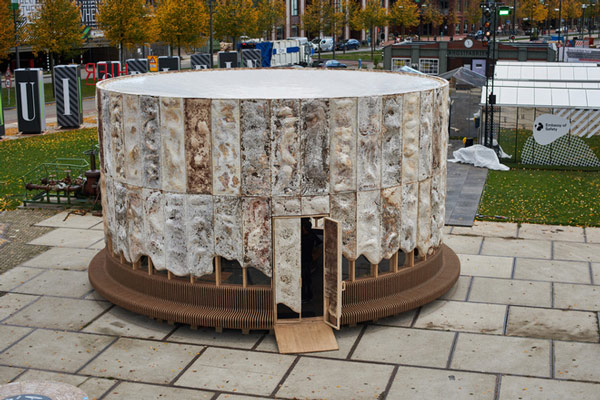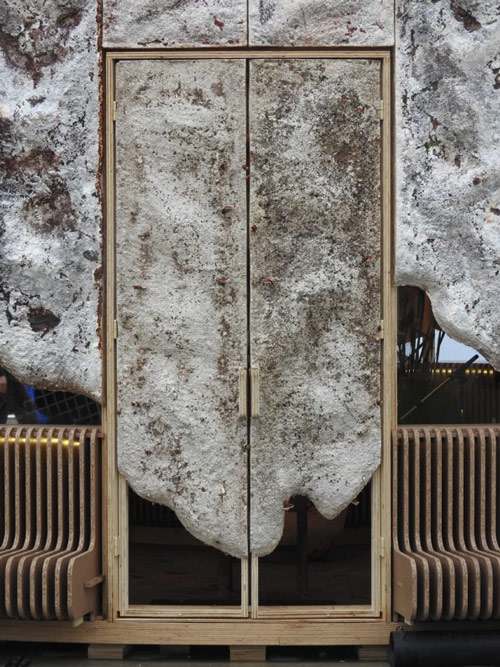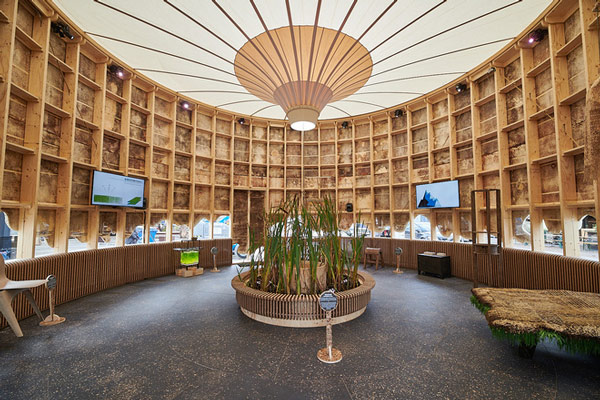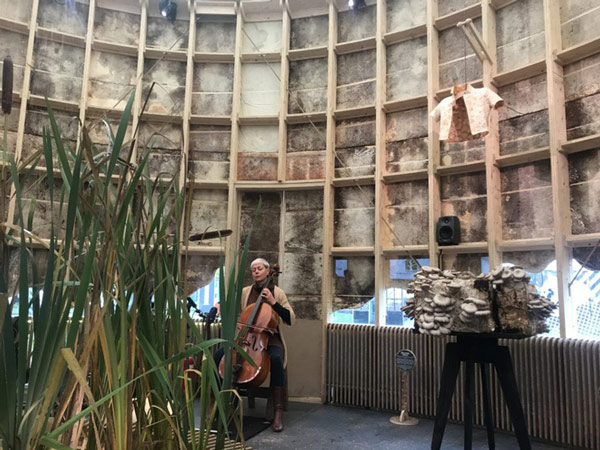The mushroom-friendly home is: the more lush the mushroom, the more it absorbs more CO2 from the air
Does living in a mushroom-covered home feel "humid"?

This cylindrical architectural block looks like an oversized birthday cake covered with spider silk, resembling some kind of Table Cave or some incomprehensible contemporary artwork but in fact not: Growing Pavilion is a house. beneficial to the environment made entirely from the material that grows from Mother Earth.
The frame of the wooden block is made of wood, the floor is made from cat tailed grass compressed into blocks, and surrounded by autotrophic mushrooms. Growing Pavilion is one of the focal points of the Dutch Design Week that takes place in Eindhoven. Two of the many studios behind this work are Company New Heroes and Krown-design; In particular, Krown-design is famous for designing and building architectural blocks made from mushrooms.

Jan Berbee, co-founder of Krown-design, explains that EPS plastic sheets covering most of the urban architectural buildings emit up to 3 times more CO2 than their own weight. But when replacing EPS with filamentous mushrooms, the emissions released from a building are greatly reduced, because the fungus absorbs twice as much CO2 as their weight.
But mushroom farming is not difficult at all. Just need a frame to shape, fill the soil with them so the mushrooms grow on their own. The frame is quite large, reaching 1.8 meters high and nearly 1 meter wide, but in less than a week, mushrooms have grown on the wooden frame. To protect the fungus from environmental influences, designers sprayed the architectural block with a protective layer made of biological material.


Berbee points out that mycelium is similar to a forest, the more it grows, the more certain it is. The mushroom wall also has the ability to isolate between the outer and inner environments, so it is also one of the candidates to make a wall for the human base of Mars in the future.
But what is the feeling of living in a mushroom-covered house?
' Mushroom products have a slight odor, ' says Jan Berbee. ' It's hard to say what it smells like. Does champignon mushroom smell? Or does abalone mushroom smell? '. It is also possible to describe the exact smell each person smells, but it will certainly be more pleasant than the three pieces of concrete and plastic covering most of our homes.
- Grow bacteria that only "eat" CO2
- Artificial leaves can photosynthesize "just like", both eliminating CO2 and creating both oxygen and fuel
- The house is energy efficient and environmentally friendly
- Straw mushroom: Instructions for planting and harvesting
- American companies use mushroom fibers to produce furniture
- Energy-saving and environmentally friendly house (continued)
- Close-up of 'monsters' has the largest body in the world
- Grow mushrooms for home furniture
- Discover interesting luscious lion mane mushroom
- Revealing 'shock' the beautiful, colorful mushroom, like a turkey tail
- 'Giant' termite mushroom weighs 3.5kg
- The most exotic mushrooms in the world
- The 5 best mushrooms to prevent type 1 carcinogens, make kids smarter
- Mushroom species are as expensive as net gold on Hoang Lien Son range
 'Fine laughs' - Scary and painful torture in ancient times
'Fine laughs' - Scary and painful torture in ancient times The sequence of numbers 142857 of the Egyptian pyramids is known as the strangest number in the world - Why?
The sequence of numbers 142857 of the Egyptian pyramids is known as the strangest number in the world - Why? History of the iron
History of the iron What is alum?
What is alum?